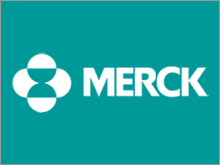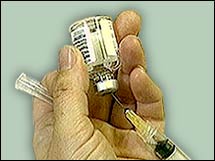The making of GardasilMerck producing vaccine at Pennsylvania plant that was (briefly) the biggest biotech plant in the world.WEST POINT, Pa. (CNNMoney.com) -- On the site of a former amusement park in a small Pennsylvania town, technicians sheathed in plastic suits labor over stainless steel fermentation tanks that look like brewery vats. But this is no brewery. This is Merck's (down $0.14 to $44.08, Charts) vaccine plant in West Point, Pa., where the technicians make Gardasil, the world's first vaccine to prevent the sexually transmitted virus that causes cervical cancer.
This disease kills 4,000 U.S. women every year, according the National Cancer Institute, with 10,000 new infections annually. Gardasil is made in 3,000-gallon vats of yeast paste, where the vaccine is fermented through a tightly-controlled process. The end result - Gardasil - could save thousands of women's lives, and make billions of dollars for Merck. Gardasil is a new entrant to the market, having been approved by the Food and Drug Administration in June. The vaccine has been approved for girls as young as nine years old, to protect them later in life when they become sexually active. Analysts' sales projections for this vaccine range as high as $4 billion a year, assuming that state governments mandate inoculation. The vaccine could be a key earner for New Jersey-based Merck, the No. 4 U.S. drugmaker behind Pfizer (up $0.21 to $27.16, Charts), Johnson & Johnson (up $0.02 to $66.62, Charts) and Abbott Laboratories (down $0.03 to $47.46, Charts). During a recent tour of the Gardasil plant, visitors breathed on a window of reinforced glass and stared at the Merck technicians, who kept their faces covered under transparent plastic masks and bibs. Tubes, pipes, and conduits snaked from the vaccine vats like entrails. Only the technicians are allowed on the manufacturing side of the glass, where impurities no bigger than half a micron are filtered from the air. That's one-hundredth of the width of a human hair. Fermentation vats are hermetically sealed to prevent impurities from spoiling the stock. Michael Baganski, senior technical adviser for biotechnology manufacturing at Merck, said that every step of Gardasil's manufacturing process is closely controlled: from the insertion of DNA into the yeast cells to create genetically engineered "seed stock;" to the frozen storage of stock at temperatures colder than minus 50 degrees Celsius; to the culturing of yeast paste in the fermenter to increase cell mass, to the incubation of yeast cells to produce Gardasil's active ingredient - the antigen VLP (virus-like particle) - at the end of the fermentation process; to the filtering of VLPs from the cell paste, to its blend with an aluminum adjuvant to bolster immune response in patients, to the cleaning and reusing of the expensive resin used to make the vaccine. In Merck parlance, this style of hyper-sterile fermentation is called "closed system processing" with "no person-to-product contact." Like its rival Pfizer, Merck is engaged in a multi-billion dollar cost-cutting campaign to offset the losses of blockbuster products. But Merck spokeswoman Janet Skidmore said that cost-cutting hasn't come to West Point, where the company is ready to ramp up Gardasil capacity as demand allows. Merck's vaccines are produced by 150 biologists, chemists and engineers at its complex of half-dozen buildings at West Point. The employees who grew up in West Point are easy to distinguish from those who did not, because they remember their parents taking them to the amusement park where the vaccine plant now stands. Gardasil demonstrated strong effectiveness during experimentation - with efficacy of 100 percent in preventing some of the viral strains - giving Merck the confidence to start adding its Gardasil addition in 2000, six years before the approval. The complex is 180,000-square feet, about the size of a large shopping mall. At one time during construction, Merck's plant-in-the-making was considered the world's biggest biotech plant. "At that time, there was more stainless steel tubing in this building than any other building in the world," said Baganski. But that title is fleeting. For now, the distinction goes to Wyeth (down $0.09 to $48.59, Charts), the sixth-largest U.S. drugmaker, and owner of the biggest biotech plant in the world. Wyeth maintains a sprawling one-million square foot biotech campus in Ireland, at the Grange Castle business park in Dublin, with 1,100 workers. Wyeth's biotech plant opened in 2005 and cost $2.3 billion to build. That's where it makes Enbrel, a treatment for rheumatoid arthritis and other types of arthritis, and Prevnar, a vaccine that prevents meningitis and blood infections in children. "The investment in the Grange Castle site demonstrates our commitment to biotech," said Wyeth spokesman Doug Petkus, in an e-mail to CNNMoney.com. "It complements our U.S. biotech presence in Andover, Mass. and will play a large role in sustaining the worldwide growth of our key products Enbrel and Prevnar." |
|


